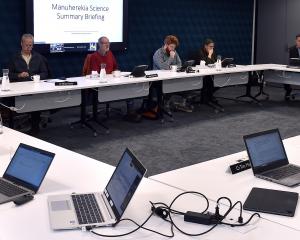
Worldwide, voters are increasingly disenchanted with politicians banging on using meaningless words.
For our part, in New Zealand, there is little excuse for lack of clarity from our politicians. We have a government that prides itself on transparency, is led by a prime minister with a degree in communication and is supported by the Green Party, who have more university qualifications between them than the rest of us have had hot dinners.
It should be easy to achieve accurate and direct communications between the Government, the Opposition and the people.
The stakes are high. Once politicians use words poorly or inappropriately, we lose trust in them. No proper debate is possible and views become increasingly polarised.
But the gibberish is increasing all the time.
Take the Wellbeing Budget released recently, watched around the world as a possible game-changer.
This oxymoron covers for something that we likely do support. It is intended to signify the importance of rating our society not totally on financial measures but also on social and health measures.

Wellbeing cannot be budgeted for. And money we spend does not have any necessary effect on wellbeing.
While there are various measures we can have of wellbeing, none can promise that an extra amount of money will produce extra wellbeing. The two words wellbeing and budget simply do not belong together.
The reason they are being put together is to give the voters an idea that somehow the Government is doing something different with the Budget.
Whether the Government is actually doing something about the parlous state of provision of health services is important. We are seriously falling behind other developed countries in mental health, dental health, cancer treatments, to name but a few. Using wellbeing beside budget is not likely to fool anyone nor to engender trust in the people of New Zealand.
We are now hearing that Kiwibuild is having a reset. Reset is the word we use for pushing a button hoping a moribund appliance will somehow spring back to life when all else fails.
Grown-ups who wanted to communicate reasonably with voters would say that it was not intended to pursue the concept of Kiwibuild and that a new approach was being taken. The Government does not need to say it was a shambles and a failure, but to be straight with voters it is unhelpful to say Kiwibuild is still happening, albeit with a ‘‘reset’’.
Councils throughout New Zealand are deciding that their areas are having a ‘‘climate emergency’’.
These words do not sit properly together. We know what an emergency is from a local government perspective. It involves civil defence, sand bags, communications about evacuations etc.
The councils who have voted for a climate emergency now have no idea what to do, apart from allocating money for it.
Nelson city has voted to employ a climate champion. Since when would the response to an emergency be a champion? Is this some new superhero, able to stop the tides in their tracks and cool the planet in a single large investment?
We really need to have discussion about how to tackle our health issues, which are reaching crisis proportions, for those who expect us to be a modern country with good, if not excellent, healthcare. We have serious issues about housing to confront. And we need coherent and effective climate change responses.
None of this will happen while we cannot use proper words and have proper conversations about the issues.
If we are banning some sorts of speech, we should start by banning politicians from using words intended to hide rather than elucidate.
Surely they should sell their ideas and plans to us, but truth in advertising should be paramount in telling us what they are up to.
One of the international wellness index measures relates to civic and democratic participation. A high rating requires an active electorate who trust their politicians and what they hear from the media.
We could be a world leader in having government and local government who actually use words to communicate clearly and accurately about what they are doing with our money, and prepared to hear arguments for and against their proposals.
That really would be a game-changer.
Now would be good, so we can practise our newly enabled democratic ideas on our candidates for local body elections coming up. — hcalvert@xtra.co.nz
Hilary Calvert is a former lawyer, politician and city councillor.
Comments
Well, yes, those are good examples. 'Plain' English is utilitarian. It does not convey nuance, so tough if Plain misses the meaning through omission of the sub clause.
Spin is easily deconstructed in NZ, due to a high level of suspicious and educated persons, across all classes.
The OECD has praised the 'wellbeing' concept.
Less monolithic than GDP Budgets, it is policy that contributes to actual need. No more 'trickle down'.
Like any economic model, Wellbeing is guaranteed due diligence. It has to deliver.
There's a video clip which condenses Stan Lee's approach to communication. He created the Marvel universe because he liked the characters, he enjoyed the stories, and couldn't wait to find out what happened next. He wrote for himself. And it happened that a lot of other people liked what he liked. That is the fresh approach we need in politics. A leader who speaks their mind. Risks exposing their flaws. Speaks truth. Tailored chameleon politicians are very unappealing. The internet reveals their fakeness very quickly. We can handle flaws, but not fakeness.












